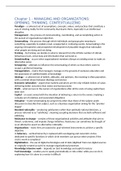Samenvatting
Summary Philosophy in Action 2.4 The Moral Compass of Contemporary Health Researchers and Professionals
- Instelling
- Maastricht University (UM)
A complete summary of all literature and lectures of the third week of philosophy in the second year of health sciences Een gehele samenvatting van alle literatuur en college's van de derde filosofieweek in het tweede jaar Gezondheidswetenschappen
[Meer zien]













